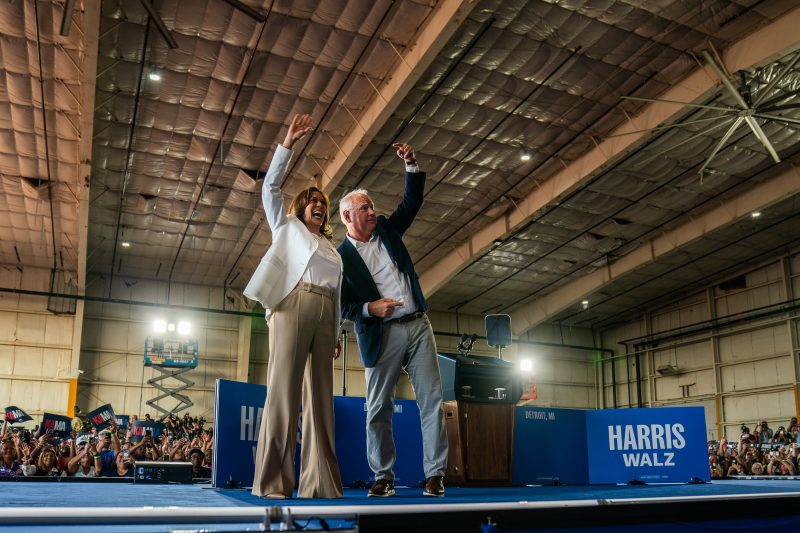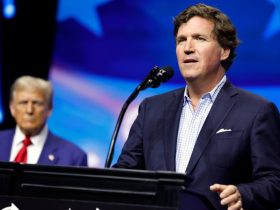A large batch of polls this week confirmed Vice President Kamala Harris’s rise in the 2024 presidential race and suggests it has continued. She now leads in the majority of national polls.
There’s a lot to take in, so I thought it’s worth isolating a few findings that stand out to me.
1. Democrats’ big enthusiasm bump — and edge
It’s been evident for a while that Democrats have been injected with huge amounts of enthusiasm since Harris replaced President Joe Biden on the ticket. Call it “vibes” or something else; it’s real. Polls this week reflect that.
While a Monmouth University poll from June showed just 46 percent of Democrats said they were enthusiastic about a Trump-Biden rematch, that number has nearly doubled to 85 percent for the Trump-Harris race. Democrats’ enthusiasm leapfrogged Republicans, whose excitement stayed steady at 71 percent.
In other words, Democrats went from a 25-point enthusiasm deficit to a 14-point advantage, at least on this specific question. (Other polls have tested enthusiasm to vote, which is a somewhat different question, and the two parties have been closer.)
Also notable from the Monmouth poll: Nearly 9 in 10 Democrats say they’re optimistic about the election, compared with about three-quarters of Republicans.
And an AP-NORC poll this week showed that 63 percent of Democrats are excited about a potential Harris administration, compared with 57 percent of Republicans for another Trump administration.
2. Democrats could be getting a Senate bump, too
A big question has been how much Harris’s momentum might filter down to other Democrats this election year — particularly with both the House and Senate very much in play. It wasn’t guaranteed it would help, especially given that Senate Democrats were already overperforming Biden.
Well, we got a big new set of Senate polls from the Cook Political Report on Thursday, and they suggest the Democrats got a significant bump there, too.
Democrats improved their margins by an average of four points across five key Senate races: Arizona, Michigan, Nevada, Pennsylvania and Wisconsin. They now lead in each race by at least seven points.
NEW: Today, we released data from our Swing State project, showing Dem Senate candidates continuing to run strong in every swing presidential state, far outpacing Harris.
Read @JessicaTaylor’s analysis: https://t.co/qdqAcQopBA pic.twitter.com/zOiQyw60sJ
— Cook Political Report (@CookPolitical) August 15, 2024
Democrats also flipped the generic ballot — where people are asked to choose between a generic Republican and a generic Democrat — in two other states that don’t feature a 2024 Senate race: Georgia and North Carolina.
In total, Democrats actually gained more down ballot than they did in the presidential race in every state except Wisconsin.
We don’t have a ton of other new polls, but the ones we have do suggest some of these races have moved slightly in Democrats’ direction in Pennsylvania and Wisconsin.
I wrote in my newsletter Wednesday about whether Democrats can dream about actually holding on to the Senate, which will be very tough given how slanted the map is against them with the specific seats that are up in 2024. They basically need to sweep all the races mentioned above, and then some.
It’s worth awaiting more data. But these numbers have to tempt them to dream beyond just the presidential race.
3. The big Walz vs. Vance gap: 14 points
Republicans have exerted plenty of energy going after the new Democratic vice-presidential nominee, Minnesota Gov. Tim Walz (D), for his record as governor, his military service and other issues. And they’ve had plenty to work with.
But for now, the latest polls show Walz is a popular running mate — and notably, significantly more popular than the GOP’s unpopular VP nominee, Sen. JD Vance (R-Ohio).
The current FiveThirtyEight average shows Walz’s net image rating (favorable minus unfavorable) is five points positive, while Vance’s is nine points negative. That’s a 14-point gap.
Vance’s image has continued to decline in recent weeks, and a Fox News poll this week really highlighted the GOP’s problem. The poll was relatively good for Trump (showing him leading nationally by one point) but was one of Vance’s worst to date. It showed his image 13 points underwater: 38 percent favorable, compared with 51 percent unfavorable.
4. The ‘double-haters’ break for Harris
My colleague Philip Bump on Wednesday broke down the evolving picture with “double-haters,” or those who dislike both major-party candidates.
The top finding from the Monmouth poll is that they are a shrinking group, declining by about half since Harris’s entry into the race. While about 1 in 5 voters were double-haters before — a historically high number — it’s now about 1 in 10.
Perhaps more important is the big reason for that decline: A lot of them like Harris. And they’re now ready to vote for her.
Among voters who still dislike both Trump and Biden, 53 percent say they’re voting for Harris, while just 11 percent say they’re voting for Trump.
Previously, those double-haters had been more evenly split between Trump and Biden. Harris winning them over is a big boost for her.
5. Other states could come into play
For almost the entirety of the 2024 campaign, we’ve been focused on a static array of swing states and Senate races. But it’s fair to ask whether we should widen our gaze a bit.
A couple of states that new polls suggest we should keep an eye on:
North Carolina, which has been regarded as a perhaps unlikely Democratic target. The Cook poll showed Harris leading there by one point (within the margin of error). We don’t have much high-quality recent polling, but the polls we do have show a tight race. And Biden lost the state only by a little more than a point in 2020.
Florida, where polls in recent days have shown Harris within two to five points. Also, on the Senate front, a Suffolk University poll this week showed Sen. Rick Scott (R-Fla.) 14 points underwater (35 percent favorable versus 49 percent unfavorable), even as other Republicans including Trump were in positive territory. Scott’s advantage on the ballot has been similar to Trump’s.










